|
Note: For a review of The Nevers, please skip down to paragraph 5. If you’re interested in the unfortunate politics behind the series, please read on.
| |
“I am genuinely exhausted and am stepping back to martial my energy towards my own life, which is also at the brink of exciting change. The Nevers is a true labour of love, but after two plus years of labour, love is about all I have to offer. It will never fade.” |
| |
Creator, co-writer and co-director of The Nevers, Joss Whedon |
| |
“I want the people who worship him to know he is human, and the organisations giving him awards for his feminist work, to think twice in the future about honouring a man who does not practice what he preaches.” |
| |
Whedon’s ex-wife, Kai Cole |
| |
“We have parted ways with Joss Whedon.” |
| |
HBO’s Official Statement |
Given the torrent of abuse accusations heaped upon Whedon recently from ex-Buffy alumni and the leads of Justice League, the first quote seems like hastily applied Polyfilla over significant cracks. The second quote is from Kai Cole, Whedon’s ex-wife, and is excerpted from a long form searing indictment of their marriage. It pretty much took Whedon down in August 2017 while he was in charge of the re-shoot and post-production of Justice League. You have to wonder if the public airing of personal and private matters had a significant effect on his psyche at that time. The well-regarded fan site whedonesque.com practically disappeared overnight after the article’s publication on thewrap.com, a Hollywood insider site. The third quote smacks of corporate self-preservation. HBO have a very expensive show to sell but if it remains compromised by Whedon’s current reputation, it will be tainted goods. Whedon either did the show a favour by bowing out or was he elbowed out? No one except those directly involved will ever know the truth so why bother speculating? Whedon responded somewhat mutedly to his ex-wife’s devastating document in 2017 and has been neither publicly contrite nor has he acknowledged the truth (or not) of those offences of which he’s been accused. Being unfaithful, spiteful, nasty and a bully are not crimes however hurtful the effects of this sort of behaviour turn out to be. Abusing one’s power is as old as the cliché but bad behaviour may be morally reprehensible but the perpetrator can still be redeemed. Or can they these days? Whatever forces drove Whedon to allegedly behave so badly cannot be known except by Whedon himself. We are extraordinarily complex creatures living in a sound bite Twitterverse. In short, being hurtful isn’t illegal and we have new ways to make unpleasant people pay, in some cases, forever. As Aaron Sorkin’s script said in The Social Network, “the internet’s not written in pencil, Mark. It’s written in ink.” These days, judgement crashes down from social media so heavily on those individuals whether the person is guilty or not, the result is often the same; a withdrawal from public life and no work on the horizon. Whedon’s last tweet was 11th November 2020. I am not saying Whedon is guilty or not but the weight of evidence suggesting he did not act like a bona fide saint is somewhat overwhelming.
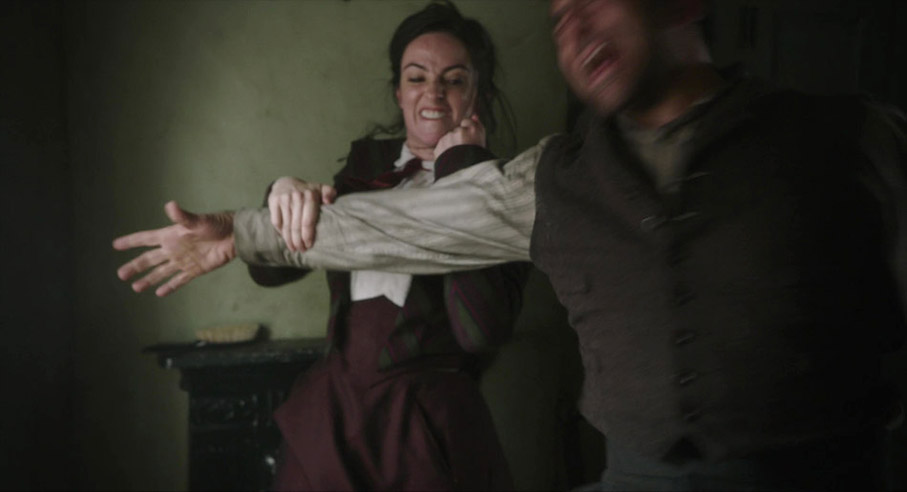
I have loved Joss Whedon’s work for a quarter of a century. In that time western society seems to have shifted on its axis so much so that in the public sphere the word “Sorry” has no discernible meaning and certainly no apparent efficacy anymore. As I said, I’m unaware of any public declaration of contrition from Whedon. Regret and remorse are emotions you feel in solitude as you watch your career disappear down around the U-bend and who knows how long anyone will have to wait (guilty or not) before being allowed to edge slowly back into the public arena. There is a phrase that has now draped a cloak of ominous finality over its once understandable, forgivable and sympathetic shoulders; “We all make mistakes.” I’m not a religious person but Jesus (allegedly) summed it up succinctly with “Let he who is without sin cast the first stone.” And by the way, are there any women here today? The stones are flying. Even, and I want to make this absolutely clear, even if they do say ‘Joss Whedon.’
As actor/director Noel Clarke’s career shatters on the cold, marble floor of retroactive social justice and his Doctor Who co-star John Barrowman scrambles around on social media to paint his on-set body part exposures as larks, fun and games, we are seeing the birth of a dawn of justice so patently out of touch with what once was termed ‘common sense’ and civility that it’s almost comical if it weren’t for those people it manages to silence and disenfranchise. Let me be absolutely crystal clear. I’m not suggesting that people who behaved abusively or disagreeably should ‘get off’ the charges. There are prices to be paid. When people’s abuse of others strays into legally punishable territory then let the law take its course. I’m saying that opprobrium 2021 style means that these people are effectively banned from their area of employment. What happened to a heartfelt apology, a few months of heel cooling and then back into the work knowing that if they step out of line again, the social justice warrior Twitterati will pop around with a noose just to save time? Now, Whedon is (I imagine) independently wealthy so we can’t throw our tear soaked handkerchiefs on to the stage expecting any sympathy for his loss of livelihood. He may have pariah status in the industry right now. Of that, I cannot be sure. I do know that ex-Pixar supremo John Lasseter, for the crime of ‘grabbing’, ‘kissing’ and ‘commenting on physical attributes’, was summarily ousted and shunted off to the sidelines. In my experience, that was called high school.
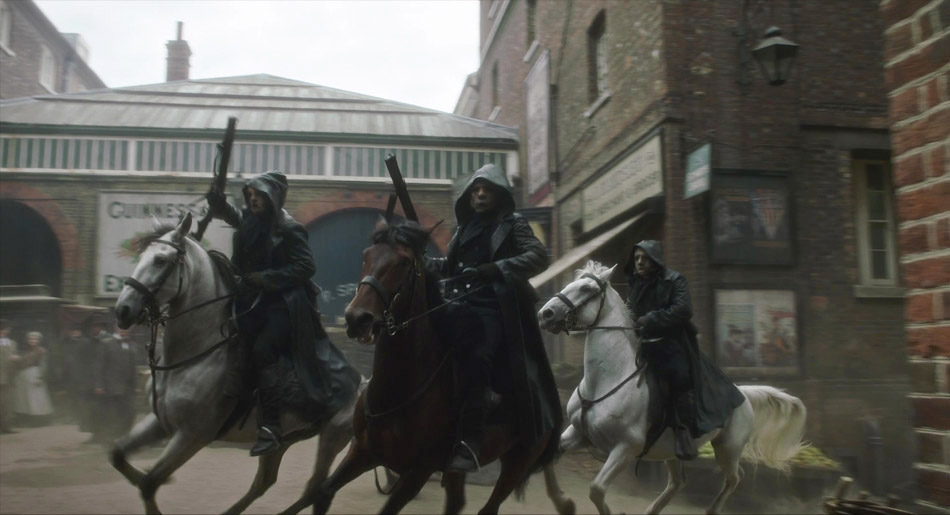
People have the inalienable right to be assholes. Human beings will never be perfect creatures attuned to the needs and sensitivities of others. ‘Selfish’ may even be the only word needed as a dictionary definition of ‘human’ although if stretched to two words, I do like ‘crafty ape’. The far left’s woke agenda is - on the surface and in theory – a tremendously worthy one but in practice it expects the scorpion not to sting the frog. That ain’t gonna happen. This is why the Constitution of the United States is such an extraordinarily smart document. Or was. It was written and couched in language specifically to disarm potential demagogues. It builds in and accounts for the potential of powerful people abusing their power. Yes, OK. It didn’t stop a failed and corrupt so-called businessman from claiming the top spot but the country hasn’t imploded yet, has it? The more we are told we are not worthy, the more we step back and revel in that unworthiness. “That paint’s wet. Don’t touch it.” And what do we do? Now let’s see if I can tear Whedon’s current muck-splattered standing in the business as far from his work as I can and appreciate objectively what this man does so well.
*
So, the essential question is; are you able to appreciate work created by someone whose behaviour has been overwhelmingly criticised? Am I ever going stop watching Buffy? Can I stop appreciating Seven because of Kevin Spacey’s involvement? Am I able to stop adoring Pixar’s early work because of disgraced John Lassiter’s creative contributions? Whedon and Lassiter worked together on the original Toy Story… A veritable den of rogues! Short answer to all three questions. No. Do not ride elephants… Not on your Nelly.
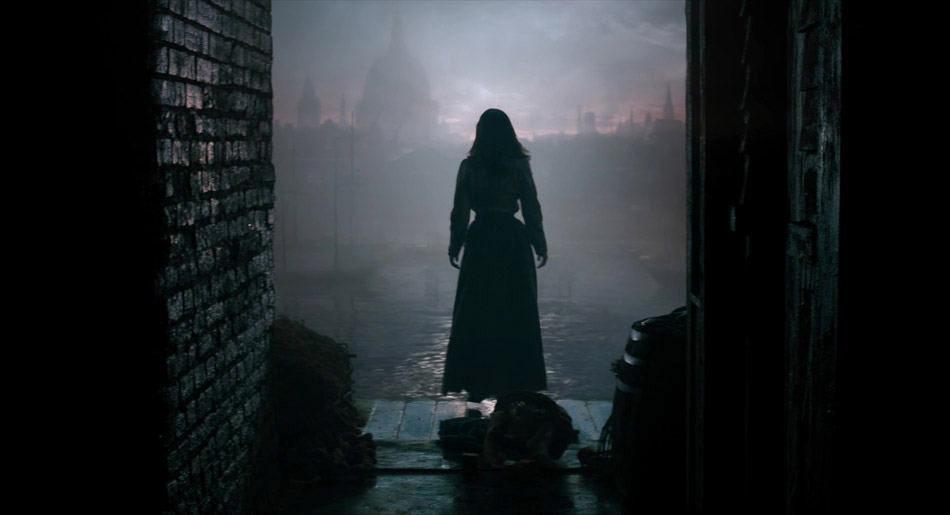
It’s London, 1896 and the capital is nestled into the Victorian era of the original Sherlock Holmes stories. A striking dark haired woman carries her baked wares through the alleyways of the city. Another finds the answer to a broken water pump. Held by two attendants, another woman is transferred from an asylum while a top-hatted gentleman, oozing self-importance, is handed a file. An older woman in a wheelchair passes by while a striking redheaded female queues at an iron staircase while her older partner walks off after kissing her goodbye. We don’t know it yet, but we have just been introduced to the main cast. There is something going on in the sky that we don’t get to see but everyone else does. As everyone’s attention is skyward, the striking dark haired woman from the opening shot, pauses and divesting herself of her wares and her outer garment, suicidally drops into the Thames… only to draw breath three years later on the floorboards of a room in her night clothes. She changes into her day attire as the water pump woman is manufacturing something with molten metal in her workshop. She too readies herself and with impeccable timing both emerge into a courtyard and join up.
“Mrs. True,” says Penance to the dark haired woman.
“Ms. Adair,” she replies.
“You look very fine.”
“I think so too,” says Mrs. True as she catches a thrown parasol.
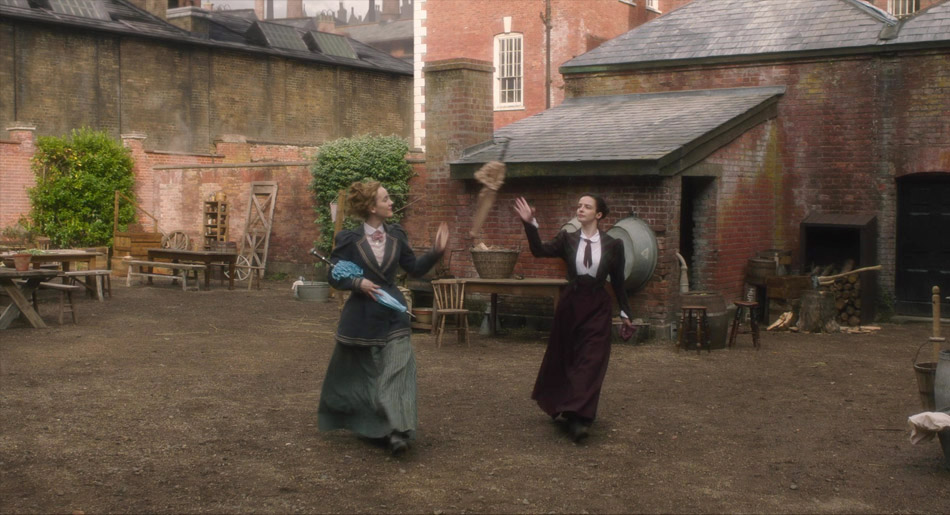
And so begins one of the most charming and entertaining partnerships in Whedon’s entire oeuvre. Amalia True is the leader of the Touched, a minority of whom live at a sponsored orphanage. Each of the Touched has a peculiar power bespoke to themselves and touched women outnumber the men by some margin. Comparisons to the X-Men are inevitable given Whedon’s connection to the Marvel comic. There’s even a wheelchair bound character of some import (but not touched). Amalia’s power is to be able to glimpse snatches of the future. She is also eminently capable of taking care of herself in a fight, something unexplained but not part of her touched ability. Whedon sticks fast to his Buffy roots here. Amalia and Penance Adair are two sides of the same coin. Amalia’s friend has a great gift with machinery and invention but also provides the moral grounding that sometimes Amalia lacks. Both actresses are Irish and while Penance speaks with Ann Skelly’s own wonderfully charming brogue, Amalia has a clipped, crisp English accent delivered by actress Laura Donnelly. I found both characters immensely appealing to watch and their complementary nature compelling.
The plot, as developed over the first six episodes, part of a 10 or 12 episode run, is dense, complex and hugely rewarding of repeated viewings. Narrative density in filmed entertainment is so welcome. The second batch of the first season started shooting last month sans Mr. Whedon (June 2021). There are hints throughout that Amalia is not what she seems. She has been given a mission but remains unsure and unaware of the details but she does know how important it is. In the hallowed gentlemen’s club, the top hatted government official Lord Massen is more concerned with maintaining the status quo of the mighty global Empire that Great Britain had created. People with extraordinary powers constitute a significant threat to that status quo. But it’s not long before the nastier elements of the touched begin to stir things up. After an attempted kidnap by luridly masked thugs, a young touched girl with language issues is rescued by Amalia and Penance in what can only be described as being in true steampunk fashion. Amalia has a vision which takes her to the opera where another character, the insane Maladie (a very convincing Amy Manson) is on a murder spree.
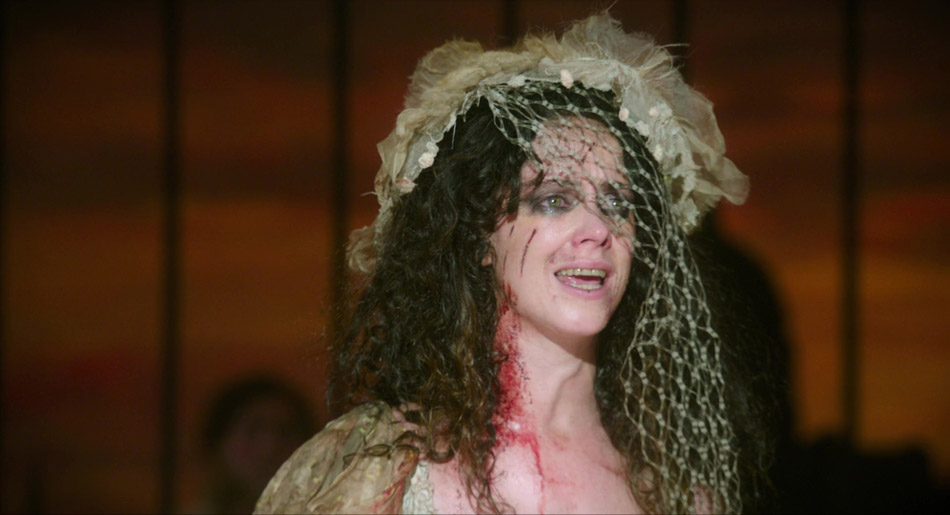
This brings in the police in the form of Frank Mundi played in a gruff, Cockney and bad tempered turn by Ben Chaplin. I’ve never seen such a great aide de character as his circle of facial hair. Shorn of same, the actor looks studious, like an English David Cronenberg and his gravelly growl of an accent is memorable and authentic. He’s a great fit for the series and despite his sharper edges, you warm to him almost immediately. Characters trying to do the right thing and hardly ever being given the opportunity to do so always get my vote. Amalia’s mission seems to be finding and protecting the Touched by taking them in to her orphanage funded by the wheelchair bound Lavinia Bidlow (played by Dollhouse’s and The Sixth Sense’s Olivia Williams). Bidlow is no true philanthropist as she has dealings with a blue-light bathed piece of real sci-fi hidden in some sort of underground cavern and very shady characters. One of those is the crime boss ‘The Beggar King’ played with violent relish by Nick Frost. The short cut to attracting the rest of the Touched is the heavenly voice of Mary Brighton (Poldark’s Eleanor Tomlinson). It can soothe and draw in those who still may be ignorant of their status. But how to amplify that ethereal sound. Enter Penance.
Whedon’s world building is exceptional over so few episodes. Every character is interlinked with almost every other character and the scenes fizz with Whedon’s ear for dialogue even given the Victorian constraints. The scene at the opera house in the pilot where French additions to English words are discussed is a brilliant example of Whedon’s command of language and how a metaphor can unseat you regardless of its truth from your own perspective. I’d say the risk of anachronism is negated by the (ahem) ‘true’ nature of Mrs. True but that’s something to mull over after you’ve seen all six episodes. There are two aspects of The Nevers I want to finally cover, one that does continue to niggle and another which dropped my jaw. The first is series wide and the second is a scene featured in episode 3.
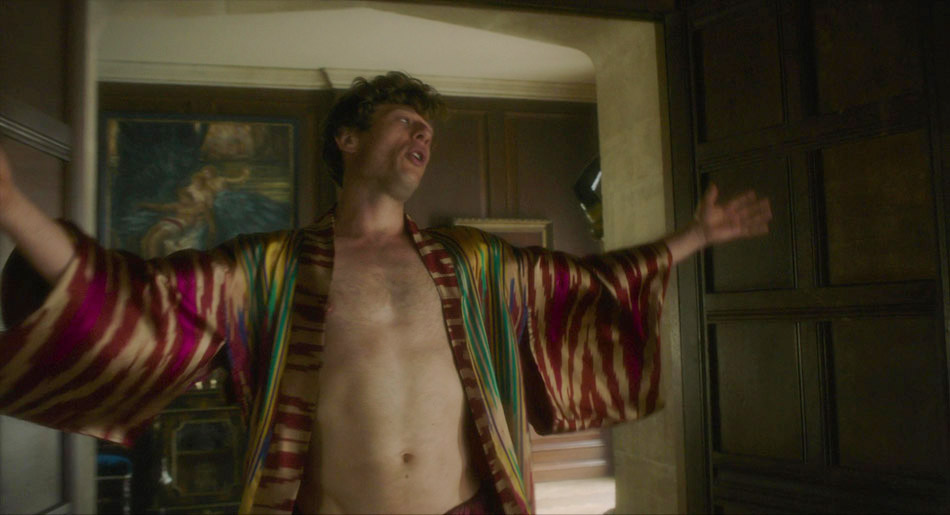
So firstly, there is always a perfectly good reason for the inclusion of characters and situations which may be designed to pay off further down the line. But there is one character who seems to exist solely to allow Game of Thrones levels of nudity and sex, a new addition to a Joss Whedon series. My discomfort is probably due to my own misreading of the character’s and Whedon’s purpose. James Norton plays Hugo Swann, an aristocratic hedonist who’s in the process of opening a sex club. He has fingers in many pies but exists in a part of the London scene that seems far removed from the central feminist drama. Why the ‘edge’ of this ‘adults-only’ element was necessary is something only Whedon knows but the series would work perfectly well without it but then again, that’s my ignorance on display (as well as countless breasts and so far just the one penis). Whedon is doing his critics’ work for him at this moment in the series’ run. Titillation only is no reason for graphic nudity these days. Whedon no longer has the opportunity to bring the grand arcs down to Earth so we may never know why the ‘adult’ aspects were deemed necessary.
The primary pleasure of The Nevers is the relationship between Amalia and Penance. It’s deeply honest, loving without a sexual component – both characters are presented as heterosexual – and somewhat pure of heart. But there are many other pleasures - steampunk retrofitting a talented 21st century imagination on to a Victorian backdrop is the obvious one which brings me to the second aspect I wanted to close with. There are two dialogue lines thrown away, that refer to the Beggar King’s very big henchman, Odium (Martyn Ford). His boss says (from memory) “I just can’t get him into a bath,” as a reason for his rank body odour. You only catch this foreshadowing watching for a second time. The reason this hulk of a man cannot get into a bath is because he is one of the Touched and his odd turn is that he is incapable – despite his bulk - of breaking the surface of water. Let me set the scene. Odium has been charged with dispatching Amalia (does that euphemism for assassinate still resonate today?) Amalia is heading back to London in a carriage after finding a book with photographs and descriptions of more Touched from the fake orphanage set up to lure the Touched in for horrific experimentation. As she caresses a pair of gloves, the carriage is violently rocked and smashed into causing Amalia to drop from a bridge into a river.

Odium then strides forward to finish the job with a chain and a hook and it is suddenly revealed that he can walk on the surface, disturbing the water but incapable of breaking the meniscus. It is a startling sight but we’ve only just got started. Here is a man who is a serious threat to the star (we all know she’ll survive but not how). All she can do is swim until her lungs burn but he’s always there standing at the surface where she takes a gulp of air only to receive a boot or fist in the face for good measure. Then the hook starts flying, crashing into the water trying to snag Amalia. When he finally gets hold of her in a chokehold, we get a signature move in female superhero circles, the wrap-around.

I won’t reveal anymore but it is an absolute showstopper, a masterful sequence, one that almost undercuts the climax of the episode. At the close of each show HBO has provided a behind the scenes look at one aspect of the filming. Needless to say, this fight (3’ and 32” of screen time) took an age to plan and a whole two weeks to shoot. There’s nothing a good film crew can’t solve given the resources to do so. While this behind the scenes peek centred on actress Laura Donnelly (her real Irish accent is so easy on the ear) and the stunt and VFX team, the one person you’re missing on location and in the green screen studio was director Joss Whedon. Now this fight could have been storyboarded, signed off and shot by the second unit (using the principal actor for this sequence makes this sound unlikely) so I can only assume that Whedon has been edited out of the behind the scenes material and that’s a little sad despite the reasons he left the project. But HBO is acting in the show’s best interests I suppose.
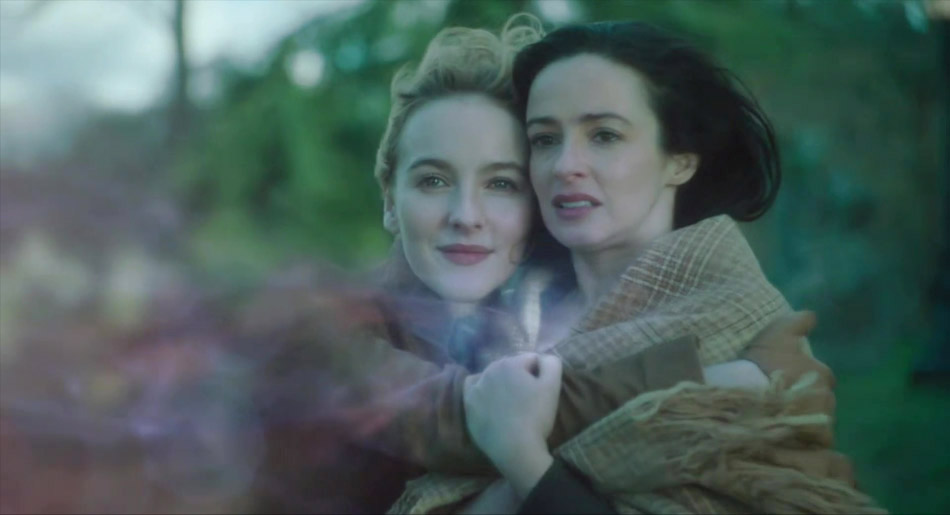
The Nevers took a second broadside hit after Whedon’s departure. The pandemic lockdown halted production for a time. Covid has changed film and television making, possibly for a more considerable time than anyone could have anticipated. Despite all the set-backs, The Nevers’ six episodes reveal a densely layered world with impeccable production value in which outsiders struggle for their right to exist placed directly opposite the prevailing powers at the time. There is also that blue pulsing rock I mentioned earlier that has its own mysteries but I’ll say no more on that subject. I just hope that new showrunner, writer Philippa Goslett, maintains the cleverness and (I have to say) Whedonesque quality of the dialogue, or perhaps its spirit and moves the whole season to a satisfying conclusion. I wish her well with that herculean task.
|